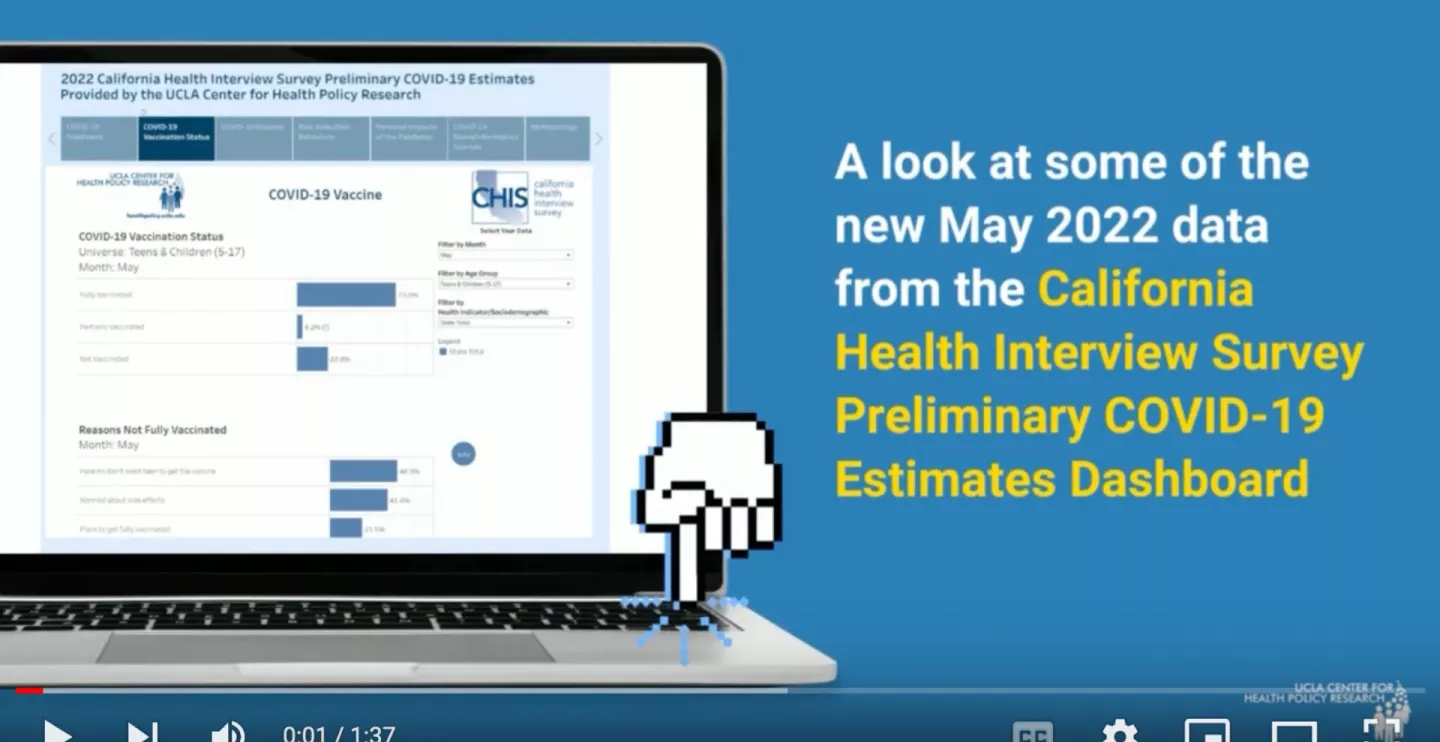About 2 in 5 (41%) unvaccinated adults in California said they never wore a mask when leaving their house in May 2022, compared to about 1 in 5 (19%) fully vaccinated adults, according to preliminary data collected from the UCLA Center for Health Policy Research’s California Health Interview Survey (CHIS).
Overall, mask wearing dropped significantly over the course of a few months, with more than half of all California adults indicating they always wore a mask in February and March 2022 (54%) compared to one-third (33%) in May 2022, after a decline in COVID cases. Black or African American (52%), Asian (51%), and Latinx (40%) adults were more than twice as likely as white adults (18%) to always wear a mask in May 2022. Additionally, in February and March 2022, 8% of California adults said they never wore a mask compared to 20% in May 2022.
These findings, made available to the public through the 2022 CHIS COVID-19 Preliminary Estimates Dashboard, includes responses from nearly 3,000 Californians in May 2022, building on previously released data collected in February, March, and April this year.
“The highly-transmissible Omicron variant spread rapidly last winter causing COVID-19 cases in California to reach an all-time high in January 2022. While the majority of Californians were still taking safety precautions in February and March, we saw those numbers drop in May just as the BA.4/BA.5 wave began to rise,” said Todd Hughes, CHIS director. “The CHIS data allow us to compare behaviors over time and identify trends and changes, which is what health departments, policymakers, and other decisionmakers need to stay on the pulse of the COVID-19 pandemic.”
Long COVID, which has the potential to impact Californians for many years to come, affected nearly 1 in 3 (32%) California adults. Latinx (43%) and Black or African American (42%) adults were more than twice as likely as white (20%) and Asian (21%) adults to experience long COVID.
In addition to long COVID and risk reduction behaviors, Californians were asked about their reasons for not receiving the vaccine or booster shots, personal and financial impacts of the pandemic, and how they got their COVID-19 news and information.
Additional findings include:
Views on Vaccines and Boosters
- Nearly 2 in 3 (64%) California adults who were not fully vaccinated said they were worried about side effects, 42% felt the vaccine was developed too quickly, 25% said they don’t know enough about the vaccine, 23% said the vaccine is unnecessary, and 22% said they don’t believe in vaccines in general.
- More than half (52%) of adults who were fully vaccinated had received a booster, 30% were very likely to receive a booster, 8% somewhat likely, 5% not very likely, and 5% not at all likely.
- Among adults who were not fully vaccinated or who were fully vaccinated but unlikely to receive the booster, more than half (54%) cited the booster being unnecessary as the reason they wouldn’t get it. Nearly 1 in 4 (24%) worried about the side effects.
Child/Teen Vaccination Rates
- Nearly 3 in 4 (73%) teens and children (ages 5–18) were fully vaccinated.
- Among the reasons teens and children were not fully vaccinated, about half (49%) said parents didn’t want their teen/child to get the vaccine, 42% were worried about side effects, 24% had plans to get fully vaccinated, 23% said the vaccine is unnecessary, and 22% said the vaccine was developed too quickly.
Risk Reduction Behaviors
- More than 1 in 6 (17%) California adults said they participated in large gatherings with more than 1,000 attendees (indoors) or 10,000 attendees (outdoors) in May 2022.
Personal Impacts of the Pandemic
- More than 1 in 9 (11%) California adults lost their job due to layoffs, business closures, or market changes.
- More than 1 in 8 (12%) experienced financial difficulties with basic necessities, such as paying bills, tuition, affording groceries, etc.
- Latinx adults were two times more likely than white adults to experience financial difficulties with basic necessities, such as paying bills, tuition, affording groceries, etc.: 17% vs. 8%.
- Nearly 1 in 5 (19%) California adults continued to work entirely from home, 12% worked some days each week from home and some day in the office, and 16% worked entirely in person because it is required by their employer.
Source of COVID-19 News and Information
- 1 in 3 (34%) adults said they got their COVID information from television and nearly 1 in 5 (19%) said social media. Only 10% said government agencies and 5% said doctors.
- Age played a factor in COVID news and information sources, with more than half of adults 65 years and older (54%) indicating they got their COVID news from television, compared to 28% of adults 18–64 years old. More than 1 in 5 (22%) of adults 18–64 years old got their COVID news from social media, compared to just 5% of adults 65 years and older.
“One of the unique aspects of the CHIS dashboards is the ability to explore the data using a range of filters — including race and ethnicity, geographic region, income level, citizenship status, and risk factors— providing a more detailed picture of the effects of COVID-19 on California’s diverse population,” said Ninez Ponce, PhD, MPP, UCLA CHPR director and CHIS principal investigator. “Next month, in addition to the June 2022 data, we will release data focused on the Asian American and Native Hawaiian and Pacific Islander communities, which have often been overlooked because of a lack of disaggregated data.”
The UCLA Center for Health Policy Research (CHPR) is one of the nation’s leading health policy research centers and the premier source of health policy information for California. UCLA CHPR improves the public’s health through high quality, objective, and evidence-based research and data that informs effective policymaking. UCLA CHPR is the home of the California Health Interview Survey (CHIS) and is part of the UCLA Fielding School of Public Health and affiliated with the UCLA Luskin School of Public Affairs.




